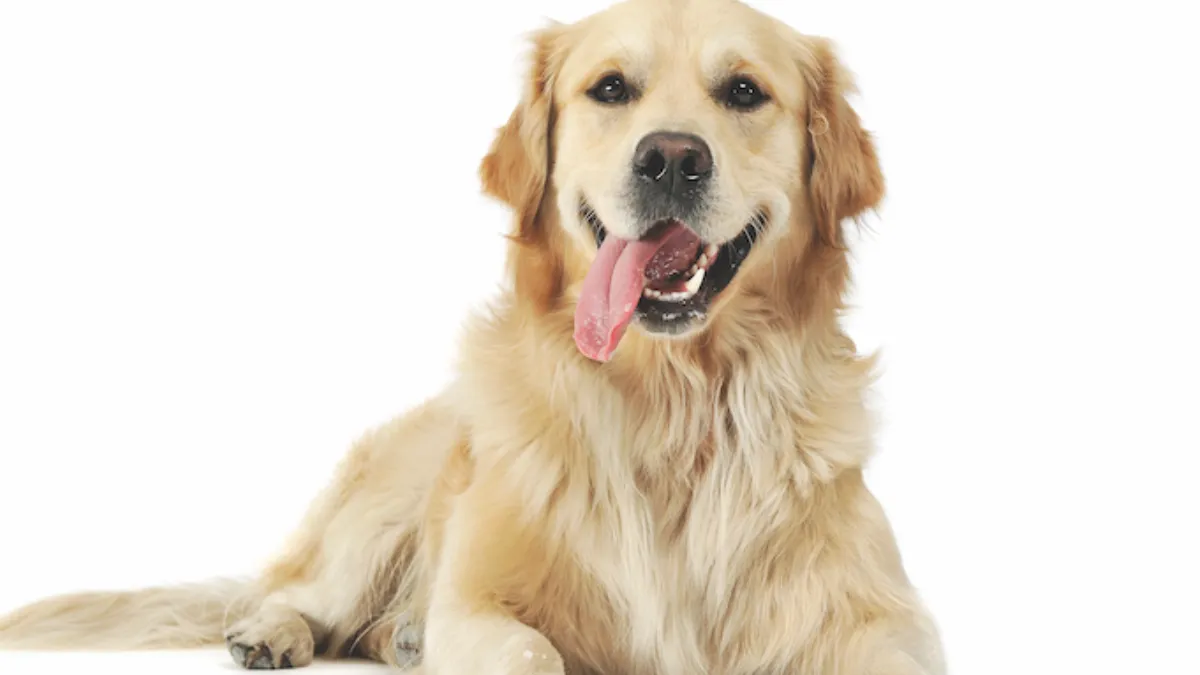Golden retrievers are one of the most beloved dog breeds in the world, known for their friendly and loyal nature. As dog owners, it's natural to want to share our food with our furry friends, but not all human foods are safe for dogs to eat. One common question that many golden retriever owners ask is whether it's safe to feed their dog's cheese.
Cheese is a popular snack and ingredient in many dishes, but it's important to know whether it's safe for dogs to consume. While some types of cheese can be a healthy treat for dogs in moderation, others can be harmful or even toxic. As with any food, it's important to understand the potential risks and benefits before feeding it to your golden retriever. In this article, we will explore whether golden retrievers can eat cheese and what types of cheese are safe for them to consume.

Can Golden Retrievers Eat Cheese?
Golden Retrievers are known for their love of food, and it's not uncommon for owners to share their snacks with their furry friends. One question that often arises is whether or not it's safe to feed cheese to Golden Retrievers. In this section, we'll explore the benefits and risks of feeding cheese to Golden Retrievers.
Benefits of Cheese for Golden Retrievers
Cheese can be a good source of calcium, protein, and other nutrients for dogs. Calcium is important for strong bones and teeth, while protein is essential for building and repairing muscle tissue. Cheese also contains fatty acids, which can help promote healthy skin and a shiny coat.
Risks of Feeding Cheese to Golden Retrievers
While cheese can be beneficial in moderation, there are some risks to consider. Cheese is high in fat, which can lead to obesity and other health problems if consumed in excess. Additionally, some dogs may be lactose intolerant and have difficulty digesting dairy products. Feeding cheese to a lactose-intolerant dog can cause gastrointestinal upset, including diarrhea and vomiting.
Another risk to consider is pancreatitis, which is inflammation of the pancreas. This condition can be caused by consuming foods that are high in fat, including cheese. Dogs with pancreatitis may experience symptoms such as vomiting, diarrhea, and abdominal pain.
In conclusion, cheese can be a safe and nutritious treat for Golden Retrievers when fed in moderation. However, it's important to be aware of the risks associated with feeding cheese, such as its high-fat content and potential for causing digestive upset or pancreatitis. Owners should always consult with their veterinarian before introducing new foods to their dog's diet.

Understanding Cheese and Dairy Products
Nutritional Value of Cheese
Cheese is a dairy product that is commonly consumed around the world. It is a good source of calcium, protein, and fat, and also contains vitamins such as vitamin A and zinc. The nutritional value of cheese varies depending on the type of cheese and the method of preparation.
Soft cheeses such as brie and camembert are higher in fat and calories compared to hard cheeses such as cheddar and parmesan. However, hard cheeses are generally higher in sodium. Cheese can be a good source of protein for vegetarians, but it is important to note that some types of cheese may contain rennet, which is derived from animal sources.
Lactose Content and Intolerance
Lactose is a sugar found in milk and dairy products. Some people are unable to digest lactose due to a deficiency in the enzyme lactase, which is responsible for breaking down lactose in the digestive system. This condition is known as lactose intolerance.
Cheese contains varying levels of lactose, depending on the type of cheese and the method of preparation. Hard cheeses such as cheddar and parmesan are generally lower in lactose compared to soft cheeses such as brie and camembert. However, even hard cheeses can contain small amounts of lactose.
Individuals with lactose intolerance may experience symptoms such as bloating, gas, diarrhea, and vomiting after consuming cheese. Individuals with lactose intolerance need to monitor their consumption of cheese and other dairy products to avoid these symptoms.

Age-Specific Considerations for Golden Retrievers
Golden Retrievers are a popular breed of dog that are known for their friendly demeanor and love for food. While cheese can be a tasty treat for Golden Retrievers, it is important to consider their age and dietary needs before feeding them any type of human food.
Puppies and Cheese Consumption
Puppies have delicate digestive systems that are still developing, and feeding them too much cheese or any other human food can lead to digestive issues such as diarrhea and vomiting. It is recommended to limit cheese consumption for puppies and instead focus on providing them with a balanced diet of puppy food that meets their nutritional requirements.
However, cheese can be used as a training reward for puppies in moderation. It is important to choose low-fat cheese options and to give it to them in small amounts to avoid overfeeding.
Senior Dogs and Dietary Needs
As Golden Retrievers age, their dietary needs change. Senior dogs may have a slower metabolism and may require a lower-calorie diet to prevent obesity. Cheese can be high in fat and calories, so it is important to limit their consumption and choose low-fat cheese options.
Senior dogs may also experience digestive issues such as constipation or gastrointestinal upset. It is important to monitor their cheese consumption and adjust their diet accordingly if they experience any digestive issues.
In conclusion, while cheese can be a tasty treat for Golden Retrievers, it is important to consider their age and dietary needs before feeding them any type of human food. Moderation is key, and it is recommended to choose low-fat cheese options and to monitor their consumption to prevent any digestive issues.
Cheese Alternatives and Treats
Golden retrievers love treats and snacks, but it's important to ensure that they are consuming healthy options that won't harm their health. While cheese is safe for golden retrievers to consume in moderation, some dogs may be lactose intolerant or sensitive to dairy products. Therefore, it's always a good idea to have some cheese alternatives and treats on hand.
Healthy Snacks for Golden Retrievers
Golden retrievers can benefit from a variety of healthy snacks that provide essential nutrients and vitamins. Cottage cheese is a great alternative to regular cheese, as it is lower in fat and lactose. It's also a good source of protein, calcium, and vitamin B12. Occasional treats such as vegetables and fruits can also be beneficial for golden retrievers. Carrots, apples, and blueberries are all healthy options that provide essential vitamins and minerals.
Homemade Dog Treat Recipes
Making homemade dog treats is a great way to ensure that your golden retriever is consuming healthy and safe ingredients. Chicken, beef, turkey, and salmon are all great sources of protein that can be used in homemade dog treats. Vegetables such as carrots and sweet potatoes can also be used in homemade dog treats to provide additional nutrients.
One easy recipe for homemade dog treats is to mix cooked chicken or beef with cooked sweet potatoes and oats. Form the mixture into small balls and bake in the oven until golden brown. Another recipe is to mix canned salmon with cooked quinoa and green beans and bake in the oven until crispy.
Overall, there are many cheese alternatives and treats that golden retrievers can enjoy. By providing healthy and safe options, owners can ensure that their golden retrievers are consuming a balanced diet that promotes good health.
Feeding Guidelines and Portion Control
Determining the Right Amount of Cheese
When it comes to feeding golden retrievers cheese, it is important to keep portion control in mind. While cheese can be a tasty treat for dogs, it is also high in calories and fat. Overfeeding cheese can lead to weight gain and obesity in dogs, which can cause health problems in the long run.
To determine the right amount of cheese to feed your golden retriever, consider their weight and activity level. A general rule of thumb is to feed no more than 10% of their daily calorie intake in treats, including cheese. For example, a 50-pound golden retriever that requires 1,200 calories per day should not consume more than 120 calories in treats, which would be roughly 1-2 small cubes of cheese.

The Role of Cheese in Training
Cheese can be a useful tool in training golden retrievers. As a high-value treat, it can be used as a reward for good behavior and as motivation for learning new commands. However, it is important to use cheese in moderation and to balance it with other rewards, such as praise and playtime.
When using cheese as a training reward, it is important to consider the size of the treat. Small, bite-sized pieces of cheese can be more effective than large chunks, as they allow for more frequent rewards without overfeeding. Additionally, using cheese as a training reward can be a fun and engaging way to bond with your golden retriever and reinforce positive behaviors.
Overall, feeding golden retrievers cheese can be a fun and tasty way to reward good behavior and bond with your furry friend. However, it is important to keep portion control and moderation in mind to prevent weight gain and obesity. By following these feeding guidelines and using cheese as a tool in training, you can help your golden retriever stay healthy and happy.
Potential Health Issues from Cheese
While cheese can be a tasty treat for humans, it may not be the best choice for dogs like Golden Retrievers. Cheese is high in fat and cholesterol, which can lead to obesity and other health problems if consumed in excess. Additionally, some dogs may have adverse reactions to cheese, resulting in digestive issues.
Digestive Problems and Remedies
Consuming cheese can cause digestive problems in dogs, such as gas, diarrhea, and vomiting. This is because dogs have trouble digesting lactose, which is present in cheese and other dairy products. If a Golden Retriever displays any of these symptoms after eating cheese, it is recommended to withhold cheese from their diet and monitor their symptoms. If the symptoms persist or worsen, a visit to the veterinarian may be necessary.
Long-Term Health Risks
Feeding a Golden Retriever cheese regularly can lead to long-term health risks, such as obesity and pancreatitis. Obesity can increase the risk of other health problems, such as joint pain and heart disease. Pancreatitis, on the other hand, is a serious condition that can be caused by a high-fat diet. Symptoms of pancreatitis include vomiting, diarrhea, and abdominal pain. If a Golden Retriever is diagnosed with pancreatitis, they may require hospitalization and a special diet.
In conclusion, while cheese may be a tasty treat for humans, it is not recommended as a regular part of a Golden Retriever's diet. If you do choose to give your Golden Retriever cheese, it should be in moderation and only as an occasional treat. It is important to monitor your dog's health and watch for any adverse reactions or symptoms. If you have any concerns, consult with your veterinarian for guidance.

Consulting with a Veterinarian
When it comes to feeding cheese to golden retrievers, it's always best to consult with a veterinarian first. Veterinarians are knowledgeable about the nutritional needs of dogs and can provide dietary advice based on the individual needs of the dog.
Cheese, like many human foods, can be high in fat and salt, which can lead to health problems in dogs if consumed in large quantities. A veterinarian can help determine if cheese is an appropriate addition to a golden retriever's diet and in what amounts.
It's important to note that not all dogs can tolerate cheese, and some may be lactose intolerant. A veterinarian can also advise on whether a dog has any underlying health conditions that may be affected by consuming cheese.
Overall, consulting with a veterinarian before feeding cheese to a golden retriever is a wise decision. They can provide expert advice on the nutritional needs of the dog and help ensure that the dog's diet is balanced and appropriate for their individual needs.
Conclusion:
In conclusion, considering a Vet's Professional View on the query "Can Golden Retrievers Eat Cheese?" reveals valuable insights. While many dogs enjoy cheese, it's essential to approach it with moderation and awareness. The veterinarian's perspective emphasizes that some dogs may be lactose intolerant, and excessive cheese consumption can lead to digestive issues. However, when provided in moderation and accounting for individual sensitivities, cheese can be a tasty and protein-rich treat for Golden Retrievers.
Consultation with a veterinarian remains crucial, as they can offer personalized advice based on the dog's health, dietary needs, and potential allergies. Ultimately, incorporating cheese into a Golden Retriever's diet requires a balanced approach, ensuring the enjoyment of this treat while prioritizing the dog's overall well-being under the guidance of professional veterinary care.




